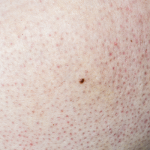Psoriasis is a common skin condition affecting over 8 million Americans. About 80 to 90 percent of people living with psoriasis experience plaque psoriasis. Living with plaque psoriasis is often challenging and can have a significant influence on quality of life issues. Almost two-thirds of those with plaque psoriasis consider their condition adversely impacting their day-to-day lives. That’s a significant toll on the physical and emotional well-being of those living with this medical condition.
Columbia Skin Clinic sees and treats many patients with all forms of psoriasis, and our board-certified dermatologists are here to help those who suffer from the condition.
What is plaque psoriasis?
Plaque psoriasis is the most common form of psoriasis. Plaque psoriasis is considered an autoimmune disease. The cells of your skin reproduce too rapidly, often piling up and creating scaly lesions, often called plaques. Under normal circumstances, your skin cells take about one month to mature and slough off from the surface of the body. For those with psoriasis, this process only takes about three to four days, and the mature cells don’t fall away from the body.
What are the other types of psoriasis?
There are five different ways that psoriasis can manifest, including plaque psoriasis. All are characterized by cosmetic or dermatological conditions of the skin. The four other types of psoriasis include:
- Guttate, often beginning in childhood, appears as small, red spots on the scalp, torso and limbs.
- Pustular, which is usually found on the palms of the hand and soles of the feet, is typified by severe scaling and pus-filled lesions.
- Inverse presents as bright red, shiny lesions in the folds of the skin, such as in the armpits, under the breasts or groin area.
- Erythrodermic, both rare and serious, is characterized by severe reddening of the skin and significant scale shedding. It’s not unusual to also have an increased heart rate and severe pain and itching. Please contact your dermatologist immediately should you experience this uncommon psoriasis.
What is the cause of plaque psoriasis?
The exact cause of plaque psoriasis isn’t entirely known. It’s believed that problems with an overactive T cell response in your immune system may mistakenly cause the rapid production of new skin cells — leading to psoriasis outbreaks or flare-ups. Just what causes T cells to malfunction in people with psoriasis isn’t entirely clear.
In addition, research suggests genetics play a prominent role. Your family history is a significant risk factor if one or both parents have psoriasis. Obesity and smoking may also predispose you to psoriatic conditions.
Several triggers are recognized for causing psoriasis flare-ups. These include stress, viral or bacterial infections, skin injury and excessive alcohol use.
What are the symptoms of psoriasis?
Depending on the severity of the psoriasis, the patches can range from a few minor spots of scaling to major outbreaks covering large areas of the body.
Some of the more common symptoms to watch for include:
- Red patches of skin that may be covered with silvery scales
- Small red spots that may be scaling
- Dry, cracked skin that may itch or bleed
- Itching, burning or painful skin
- Scaly red plaques on the hairline or scalp
What is the treatment for psoriasis?
Currently, there is no cure for plaque psoriasis. But there are several treatment options available that help to prevent flare-ups and to ease the symptoms. Your dermatologist can best address your treatment needs after a thorough examination and discussion of your medical history. The treatments available include topical treatments, light therapy and prescription medication. Sometimes a combination of these therapeutic approaches is used.
For mild to moderate cases, topical treatments can be effective. Topical treatments are creams and ointments, such as corticosteroid, vitamin D and retinoid creams. Moisturizing lotion may also be recommended along with these creams.
There are also many new and promising medications for psoriasis. These are used if you have severe psoriasis or don’t respond well to other treatments. They can be either oral or injected medications. Typically, they are prescribed for brief periods and may be used in conjunction with other treatment options, depending on your individual treatment needs.
When should I seek treatment?
Struggling with a skin condition, such as plaque psoriasis, can seem hopeless and discouraging. If you believe you have psoriasis, the first step is to see your dermatologist and get an accurate diagnosis. The good news is that there are treatment options available. In time, you can experience a reduction in your symptoms and an improvement in your sense of well-being.
At Columbia Skin Clinic, we not only offer clinical dermatology but cosmetic treatments as well. Our highly trained staff can help you cope with psoriasis and develop a treatment plan that works best for your skin type and lifestyle. Book a dermatology appointment today at one of our three convenient locations in Columbia, Irmo and Camden.






